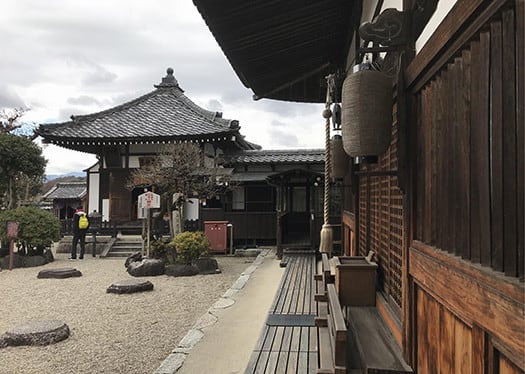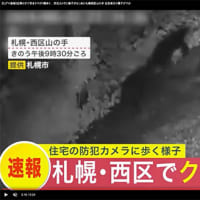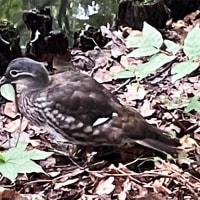


古代史での飛鳥寺の存在というのは非常にセンシティブ。
大化の改新・乙巳の変以前の実質権力中心は蘇我氏であったことは
疑いがなく、その積極的な仏教導入策が国家方針となっていた。
当然、天皇権力もそれを支持したり追認したりだっただろうから、
蘇我氏を滅亡させた後も、飛鳥寺自体は存立し続けていた。
ただ、飛鳥寺はより蘇我氏色が強かったので摩擦は大きかった、
そんなふうに理解出来るのではないかと思います。
法隆寺のように完全に「国家施設」としての存立基盤ではなかった。
写真上は飛鳥大仏が鎮座する「金堂」から「西金堂」方向をみたもの。
下の航空写真は飛鳥寺の説明掲額の一部で伽藍配置をあらわすもの。
現在は伽藍内部も農地になっていたりする。
いわゆる国家としての保護がなされてこなかったことがわかる。
王権にとっては鎮護国家という大方針に沿って
国策として仏教導入を進めていくのに、この時代までの
仏教導入の先覚者である蘇我氏からヘゲモニーを奪取するのが、
乙巳の変だったというようにも理解出来るのでしょう。
きのう書いたわたしの敬愛する鞍作止利さんの飛鳥大仏が
何度かの火災などに見舞われたのは、そういう経緯が与っていたのでしょう。
しかしこういう経緯の寺院がそれでも存続し続けていることが
ある意味では非常に面白く、日本的なものを感じさせてもくれる。
権力中心であったものがやがて鄙びていく様子が、
ある種のやすらかさを訴えてくるとも思えるのですね。
たしかに法隆寺のような歴世、尊崇を集め続け権力の保護も
強くイメージさせる存在も貴重だけれど、
こういった存在もまた現代にまで生き延びてきているのは、
平和な国の象徴のようでもあって心が安らぐ。
いま飛鳥寺にはむしろ鄙の空気感が漂っていて
きのう書いたような個人としての鞍作止利さんの生きた証まで
すぐに身近なモノとして存在感があるのだと思うのです。
すぐ近くの石舞台には物言わぬ墳墓施設という感じを受けるけれど
こちらでは鄙の安堵感に包まれた人跡という雰囲気が薫っている。
古寺巡礼的な建築探訪、年齢と共に深まってくる興趣がありますね。
English version⬇
[Great Sangharama by Mr. Soga, Japan's earliest temple, Asuka-dera-3]
The existence of Asuka-dera in ancient history is very sensitive.
Before the Taika Reform and Isshi Incident, the real power center was Mr. Soga.
There was no doubt that the aggressive policy of introducing Buddhism was the national policy.
Of course, the emperor's power would have supported or confirmed it, too.
Even after the destruction of Mr. Soga, Asuka-dera itself continued to exist.
However, the friction was great because Asuka-dera had a stronger Soga color.
I think you can understand it like that.
It was not a complete foundation of existence as a "national facility" like Horyuji Temple.
The photo above shows the direction from "Kondo" where Asuka Daibutsu is enshrined to "Nishi Kondo".
The aerial photograph below is a part of the explanation posted at Asuka-dera Temple and shows the arrangement of the cathedral.
Currently, the inside of the cathedral is also a farmland.
It can be seen that the protection as a so-called nation has not been made.
In line with the big policy of a guardian state for the kingship
Until this era, to promote the introduction of Buddhism as a national policy
Taking the hegemony from Mr. Soga, a pioneer of the introduction of Buddhism,
You can understand that it was a strange thing about Otomi.
The Asuka Daibutsu of my beloved Tori Busshi, who I wrote yesterday
That's probably the reason why I was hit by several fires.
However, the fact that the temple with such a background still exists
In a sense, it's very interesting and makes me feel Japanese.
It seems that what was centered on power will eventually crawl.
It seems that it appeals for some kind of ease.
Certainly, it continues to gather reverence and protection of power like Horyuji Temple.
The existence that makes you have a strong image is also valuable,
It is that these beings have survived to the present day.
It seems to be a symbol of a peaceful country, so it makes me feel at ease.
At Asuka-dera, there is a feeling of redneck.
Tori Busshi's living proof as an individual as I wrote yesterday
I think that it immediately has a presence as a familiar item.
The stone stage nearby feels like a silent tomb facility,
Here, the atmosphere of a human being surrounded by the relief of the countryside is fragrant.
There is a pilgrimage to old temples, and there is an interest that deepens with age.



















